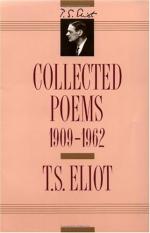|
This section contains 2,248 words (approx. 8 pages at 300 words per page) |

|
The strength of T. S. Eliot's poetry depends on insights that mediate between morality and psychology. Eliot understood the shifting, paradoxical nature of our deepest emotions and judgments, and tried to embody this quality in his style. "All that concerned my family," he once said, "was 'right and wrong,' what was 'done and not done.'" It became the poet's discovery that what is wrong when acted may be right when remembered, that today's gladness justifies yesterday's grief, and that religious serenity may be the upper side of skepticism.
Most of Eliot's innovations of poetic technique strive to disorientate the reader. They give one a literary experience that follows the contours of reversible emotions. Reading Eliot's lines sympathetically, one enters into a drama (often incomplete) of moral judgment imposing itself on a flux of contradictory moods. His ambitious effects are formal equivalents of the process by which...
|
This section contains 2,248 words (approx. 8 pages at 300 words per page) |

|


